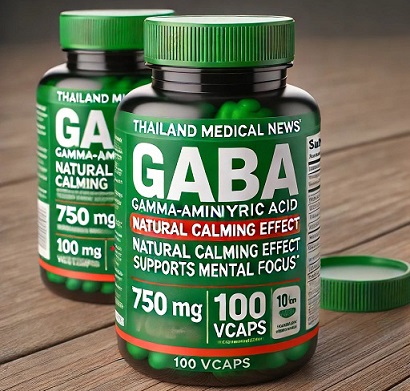Nikhil Prasad Fact checked by:Thailand Medical News Team Jun 19, 2024 10 months, 2 days, 20 hours, 47 minutes ago
Supplements:
Understanding GABA - The Brain's Calm Creator
Gamma-aminobutyric acid (GABA) is a key player in our nervous system, acting as the main inhibitory neurotransmitter. This means it helps balance brain activity, preventing over-excitement that can lead to various neurological issues. While GABA is naturally produced in the brain, there’s growing interest in how dietary GABA found in foods like brown rice, soy, and certain fermented products can impact our health.
 How Oral GABA Can Boost Your Brain and Body
Can GABA Cross the Brain’s Barrier?
How Oral GABA Can Boost Your Brain and Body
Can GABA Cross the Brain’s Barrier?
A major question in the scientific community is whether GABA from food can cross the blood-brain barrier (BBB) and directly affect brain function. Traditional beliefs held that GABA couldn’t make this journey, but recent studies challenge this idea. Some animal studies suggest small amounts of GABA can cross the BBB, potentially through specific transport systems. However, more human studies are needed to confirm this.
GABA and the Gut-Brain Axis
Even if GABA can’t cross the BBB directly, it may influence the brain through the gut-brain axis. This complex communication system links our gut and brain, involving neural, hormonal, and immune pathways. Gut bacteria can produce GABA, which may affect brain function indirectly by interacting with the enteric nervous system (ENS) or the vagus nerve, a crucial communication route between the gut and brain.
Dietary Sources of GABA
GABA is found in various foods, such as brown rice, soybeans, adzuki beans, and fermented foods like kimchi and yogurt. Some foods are even enriched with GABA, like certain cereals, breads, and cheeses.
Supplements are also available, providing an easy way to increase GABA intake.
Potential Health Benefits of GABA
-Better Sleep: Several studies suggest GABA may improve sleep quality. For example, consuming GABA-enriched rice has shown to enhance feelings of restfulness upon waking and reduce sleep onset latency. GABA supplements also appear to increase non-REM sleep stages, promoting deeper, more restorative sleep.
-Stress and Anxiety Reduction: GABA’s calming effects can help reduce stress and anxiety. Studies involving GABA-enriched chocolate and other supplements show decreased heart rate variability and reduced salivary markers of stress. This suggests GABA can help the body manage stress more effectively.
-Pain Management: The GABAergic system in the central nervous system (CNS) plays a significant role in pain modulation. Reduced GABA activity is linked to heightened pain sensitivity. GABA-like drugs, such as gabapentin, are already used to manage pain by modulating specific CNS channels, reducing neural excitation, and alleviating pain.
-Neuroprotection and Cognitive Enhancement: GABA’s abil
ity to calm neuronal activity might protect against neurodegenerative diseases and improve cognitive functions. Animal studies show that GABA supplementation can enhance memory and learning, potentially by increasing levels of acetylcholine, a critical neurotransmitter for learning and memory.
GABA's Role in Blood Pressure Regulation
GABA has shown promise in lowering blood pressure. Studies in hypertensive rats demonstrated that both GABA and GABA-enriched fermented milk products significantly reduced blood pressure. Human studies also support these findings, with GABA-enriched foods like cheese and fermented milk showing potential in managing hypertension without adverse side effects.
GABA from Gut Microbiota
Our gut microbiota, the trillions of bacteria living in our intestines, can produce GABA. This gut-produced GABA might influence our mental health. Studies have found a correlation between certain gut bacteria and increased GABA levels, which are associated with reduced anxiety and depression symptoms. Probiotic supplements containing GABA-producing bacteria have shown promise in improving mental health and overall well-being.
Looking Forward: The Future of GABA Research
While the benefits of dietary GABA are promising, more research is needed to fully understand its potential. Future studies should focus on robust clinical trials to determine the efficacy and safety of GABA supplementation across different populations. This research could lead to new dietary strategies and interventions for managing various health conditions, from anxiety and sleep disorders to hypertension and neurodegenerative diseases.
Conclusion
GABA is a vital neurotransmitter that plays a crucial role in maintaining brain health and function. Its potential benefits, from improving sleep and reducing stress to managing pain and lowering blood pressure, make it an exciting area of research. As we continue to explore the effects of dietary GABA, we may uncover new ways to enhance our health and well-being through simple dietary changes.
The study review on GABA by researchers from the School of Medicine, Galway Neuroscience Centre, Ollscoil na Gaillimhe - University of Galway-Ireland was published in the peer reviewed journal: Nutraceuticals.
https://www.mdpi.com/1661-3821/4/2/15
For more updates about various
Supplements, keep on logging to Thailand Medical News.
Read Also:
https://www.thailandmedical.news/news/ucla-researchers-finds-that-supplementation-with-the-amino-acid-gaba-can-reduce-sars-cov-2-viral-load,-covid-19-severity-and-risk-of-mortality
https://www.thailandmedical.news/news/drug-news-study-shows-gabapentin-often-prescribed-to-women-for-pelvic-pain-is-ineffective-and-causes-lots-of-side-effects
